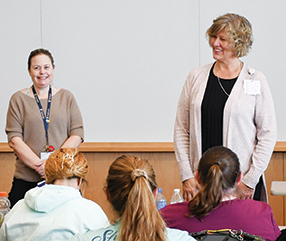
TidalHealth workforce development manager Lori Lee, right, speaks to Wor-Wic nursing students with Kirsten Sample, RN, TidalHealth talent acquisition specialist.
A perfect storm has blown into the health care world recently. COVID-19, burnout, an aging workforce and growing demand for services have fueled a nationwide staffing crisis, and the Eastern Shore has felt the pressure as well. Wor-Wic has responded to the community need, working with local facilities to educate health care workers. In return, health systems are working to make clinical rotation experiences and hiring practices more meaningful and accessible to Wor-Wic graduates.
“One of the initial focuses of my job was to strengthen existing pipelines. One strong tie was community colleges,” said Lori Lee, workforce development manager at Salisbury-based TidalHealth, which includes two hospitals, several health pavilions, a nursing home and more than 30 physician practices.
Dr. Brenda J. Mister, department head and professor of nursing, is among those working with TidalHealth and other local health care providers to ensure student success. “Ideally, what we picture in the future is a learning community,” Mister said.
TidalHealth performed fit-testing of N95 masks that nursing students needed for clinical rotations while also holding on-the-spot interviews. Many had jobs lined up as soon as they received certification.
“I was very excited to come, because I’m a Wor-Wic grad,” said Angela Brittingham, TidalHealth senior director of emergency and trauma services. “The people we talked to were engaged. We have hired so many Wor-Wic graduates — not only registered nurses but nursing assistants, LPNs (licensed practical nurses) and patient care techs.”
“It was really helpful,” Emily Cofiell, clinical manager of the 3 West nursing floor at TidalHealth Peninsula Regional, said of the campus interviews. “It was less intimidating, and students were more open to asking questions, maybe because they were in a school setting.”
Brittingham says TidalHealth is exploring ways to enrich the experience of Wor-Wic nursing students by finding out what they are working on in the classroom and ensuring that they can experience or observe the same information at the same time during their clinical rotations.
Mister noted that students who come into nursing programs with any kind of healthcare experience under their belt — phlebotomist, CNA, LPN or even working in a non-clinical role at a doctor’s office — have an advantage. “Working with patients is a special skill,” she said.
With that idea in mind, one TidalHealth program hired people new to healthcare as non-clinical patient aides and funded their education, as well as paid time spent in school, as they completed certified nursing assistant training at Wor-Wic.
“We encourage growth,” said Kim McBride, talent acquisition specialist at TidalHealth. “They don’t have to stop at CNA, or LPN, or RN — we will help them keep going, and provide them with opportunities at every level. TidalHealth has tuition reimbursement programs, scholarships and loan repayment for fields of highest need.”
Students are also finding success in non-nursing health care roles. After receiving classroom instruction, Wor-Wic phlebotomy students get hands- on clinical training at TidalHealth Peninsula Regional in Salisbury and at TidalHealth McCready Pavilion in Crisfield, as well as at Atlantic General Hospital in
Berlin. One recent class impressed TidalHealth so much with their blood-drawing skills during their clinical rotation that four were hired as soon as they finished their program.
“The feedback has been very positive about our instruction and students’ level of preparedness, skills levels and employability,” said Ruth E. Baker, dean of continuing education and workforce development.
Community members who want to get started in the field can visit www.worwic.edu and review the many credit and non-credit options in the health care career path.